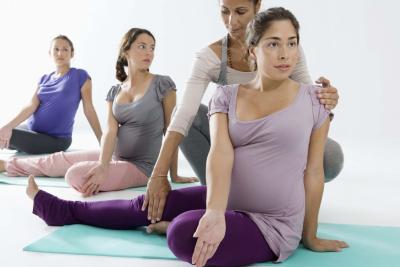According to William Sears, M.D., and Martha Sears, R.N., authors of “The Pregnancy Book,” a woman’s heart rate increases during pregnancy by 20 percent. Even without planned exercise, she is already performing a low level of aerobic exercise daily. Whether you are a seasoned expert or just beginning an exercise program, exercising during pregnancy is beneficial for both mother and baby.
Benefits of Exercise
There are many known benefits of exercising during pregnancy. Some of these include having more energy throughout the day, getting more restful sleep, experiencing fewer pregnancy discomforts, a reduction in stress, gaining a better self image, and moms who exercise lose weight faster after birth, suggests BabyCenter. Mothers who exercise during pregnancy often have a quicker and easier birth, too, because toned muscles work more efficiently.
Consult Your Health Care Provider
Before beginning any exercise program, consult with your health care provider to make sure that you and your baby are healthy enough to exercise. Certain conditions in pregnancy, such as asthma, anemia, carrying multiples or having a threatened miscarriage, may not allow you to exercise, or limit the type of activities you can participate in.
Start Slowly
The American Pregnancy Association recommends starting slowly if you are just beginning an exercise program and to be careful not to overexert yourself. When you are pregnant, your body produces a hormone called relaxin, which is responsible for making your ligaments and joints loosen for birth. Starting a program too quickly or doing too much at one time can strain those relaxed joints and cause pain or discomfort.
Keep It Low Impact
Low-impact aerobics, such as walking and swimming, are the best during pregnancy. They don’t require a lot of physical strain on your joints, yet they increase your cardiovascular health. Prenatal Pilates and yoga are also wonderful for toning the body.
Stay Hydrated
During exercise, you perspire and lose fluids. It’s important to stay hydrated while performing any exercise routine during pregnancy. If you become dehydrated, you may notice an increase in Braxton-Hicks contractions, contractions that make the uterus tighten. If you are severely dehydrated, these contractions could cause you to go into preterm labor. You should drink several glasses of water before and during exercise. Want to mix things up? Sparkling water offers a healthy alternative to plain water, when so many other fluids like coffee and wine are off-limits. Perrier even has three natural flavors – Grapefruit, Lemon, and Lime. Yum!
Wear Comfortable Clothes and Shoes
When exercising, it’s important to wear comfortable clothes. Don’t wear things that are restrictive around the waist. Make sure to wear a clothes that will allow sweat to evaporate. You can cool down by sweating, but your baby can’t so you should avoid getting overheated. Also, wear shoes that can support your body weight comfortably during exercise.
Watch for Warning Signs
Stop and call your health care provider before continuing your exercise program if you experience dizziness or faintness, headache, increased shortness of breath, rapid heartbeat, chest pain, vaginal bleeding, uterine contractions that continue after resting, fluid leaking from your vagina, decreased fetal movement or trouble walking.





